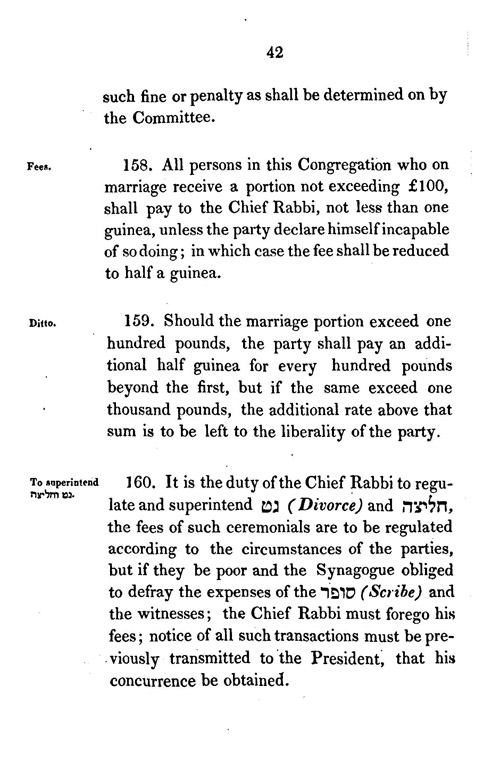Printed in 1827, the Laws of the Congregation of the Great Synagogue, Duke's Place, London (A. M. 5587), or, תקנות לעדת ישורון דק"ק בהכ"נ הגדולה דוקס פלעהס בלאנדאן, are the revised statutes of this center of Ashkenazic Jewish life in England (or at least it's elite).
This edition (revised from prior ones) is interesting because for the first time it was translated to English (the text is in Hebrew and in English). Contrast it with the 1791 edition, with only a few English words in sight. That text is almost entirely in Yiddish - plus small amounts of Hebrew, with occasional English words, by my count 10. They are:
Resolutions,
Auditors,
the casting vote,
Minute Book,
Quorum,
Hearse Driver,
Suspend,
Emoluments,
Extract and
Proxy.
The 1827 one has this very interesting one:
I will post all the regulations concerning the rabbi. The one I just showed is #163, for non-Hebraist readers. I will also show the entire regulation concerning the appointment and regulations of the chief rabbi since, after all, the appointment of rabbis is so interesting. If there's one thing everyone can agree on, it's that.
As you can see, #163 (in Hebrew, above) states that the Chief Rabbi is not empowered to enact a cherem against any person without the consent of the Commitee. Interestingly, #161 says that "In case the Chief Rabbi should think to confer the degree of חבר or מורינו on any Member of the Congregation, it is expedient that he obtain the concurrence of the Wardens thereto." That is, the granting of semicha in its greater or lesser form (in case the Chief Rabbi should think to do so) must be approved. Ouch. No wonder the Chief Rabbi of that time preferred to sit and learn all day.
Another regulation concerns the responsibility of the Chief Rabbi to conduct investigations into unspecified bad rumors about potential brides or grooms, and then has the right to decline to perform the marriage; instead he may hand it off to someone else (subject to approval). Read the rest, concerning his other duties, privileges and responsibilities. Indeed, read the entire book. And you thought your shul was a pain in the neck?





and the titles:



